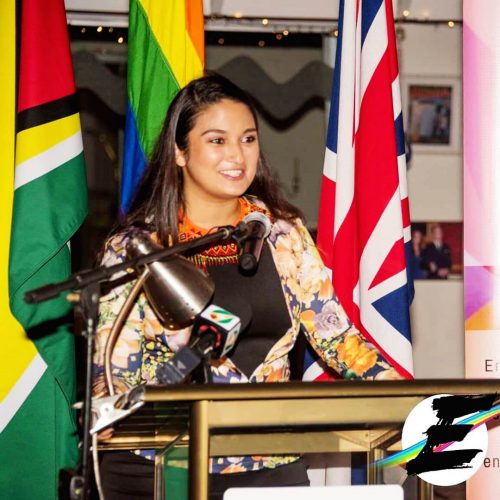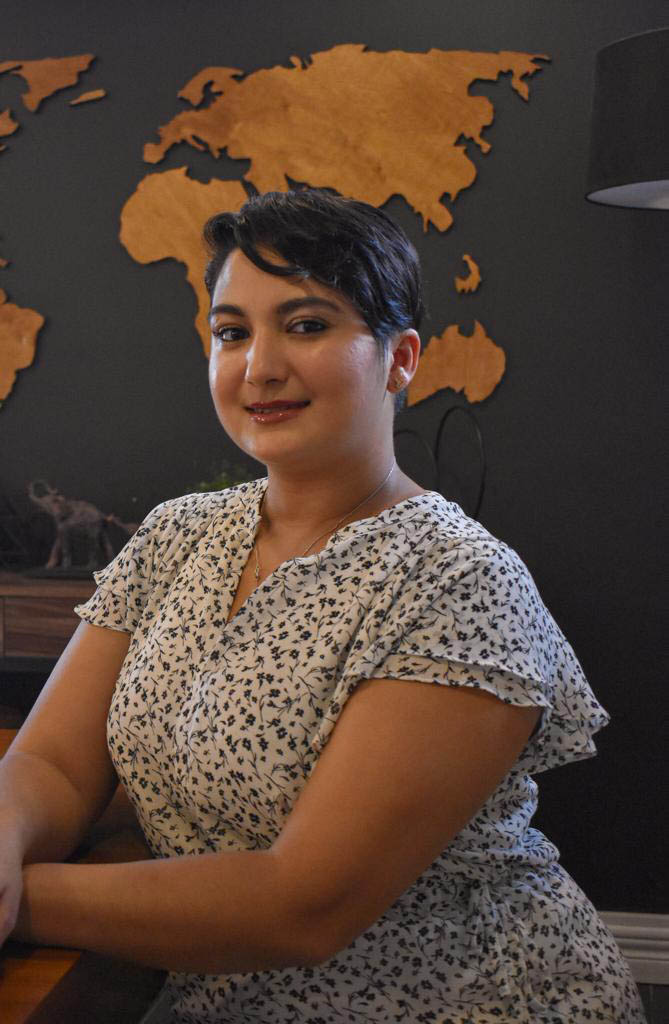Raiza Khan had started on a totally different career path when through volunteerism she found her niche, made the switch to psychology and today has opened her own practice counselling individuals, couples, children, doing group therapy.
As a Foreign Service officer at the Ministry of Foreign Affairs, Khan originally had her eyes set on one day becoming a diplomat. Instead, she is now helping others to balance their mental health and make important decisions in their lives through her Anira Counselling and Psychological Services.
Maybe the psychologist had some inclination as she pointed out that she actually studied social work at one point, though at the time she did not have the thought that she would end up where she is today.

Khan had studied in Canada from the age of 17. When she returned here in her late twenties, she began volunteering even as she gained employment at the Ministry of Foreign Affairs. It was not long before she realised that she cared more about mental health and her unpaid job than her paid job.
She then started exploring study options and found a counselling pro-gramme at the University of the West Indies, Cave Hill Campus that was right up her alley. She completed the two-year programme with the last year being an internship during which she worked in the area of domestic violence and trafficking in persons.
“It is not necessarily that I knew that I was going to be a psychologist from the time I was a child or even a teenager but it grew with exposure to things like volunteering and studying certain things. I did social work when I was 18 …there were certain signs that I was going to end up in the helping field…” she told Stabroek Weekend in a recent interview.
Khan feels she has made the right decision as she enjoys psychology overall, she also works with NGOs and does presentations at conferences.
“The field is not boring, it is very exciting, very diverse,” she added.
Influx
Khan said while she worked with children, in recent times she has taken a step back and has been referring them to colleagues but still sees minors with whom she had started sessions. She now focuses on adults.
Since COVID-19, Khan said, she has seen an increase in clients by 100%. She disclosed that she had closed her office in March, when she thought she had contracted the virus (which turned out not to be true). At that time she had 55 clients and today she is currently seeing 146. That number does not include the clients she has referred to colleagues as she has been doing for the last ten months. She only kept a few who were willing to wait as she has a waiting list.
The influx, Khan said, tells her that the limited coping mechanisms Guyanese have had been underestimated. So when socializing and drinking were taken away by the pandemic, it affected their mental health. Also, some were trapped at home with perpetrators of violence against them, toxic family members and then there was the loss of opportunities, all of which exacerbated “the already thin line people walked with their mental health by forcing them to engage or not engage,” she said. Some people’s only coping mechanism was their office and once that was taken away they were increasingly vulnerable and distressed.
Speaking about some of the issues that trigger mental illness, Khan said there is abuse, trauma, substance abuse, a lot of emotional abuse and as it relates to the latter she pointed out that for years many persons did not realise that is what they had been experiencing. And then there is narcissistic parental abuse, which is also not spoken about. She has also seen a lot of non-suicidal self harm, low self-esteem and body dysmorphia (persons seeing and hating flaws in their body that are not noticed by others). There is also of course depression, PTSD and marital problems.
Always concerned
Khan said she is always concerned or scared for clients who are suicidal but thankfully she has had none who were successful in taking their own lives.
“But I do get very concerned when my clients say ‘I am getting really fed up or that I am at a place I can’t handle…,’” she said.
There was one experience she recalled that was somewhat chilling when she had a client whose eyes were just dead.
“I have never looked into someone’s eyes and seen such nothingness… this person was just like dead in the eyes and a lot of the time we associate this with psychopaths, people who have no remorse. So that was a little scary, I was a little concerned…,” she said, adding that the client also got upset when they felt they were rejected.
Asked what keeps her going in a job that can be overwhelming some days, Khan said it is the desire to effect change, while adding that her theory is that people can be aware of what needs to be changed but if no one stops for an intervention their behaviour will not change.
“So unless you go to a therapist, or do the work yourself, or get work books or do reading… and have a support system or a support buddy who keeps you in check, you are not going to change. I need to keep going so that I can continue to help other persons to be the best of themselves,” she said.
She pointed out that mental health is not just about “scary clients with depression or anxiety but therapy and psychology can go as far as helping people to know what fields to study. What schools to go to, helping them go through the scholarship process…”
She also wants to see her clients move out of toxic environments and become independent by getting their own apartments or learning to drive as she noted that there are a lot of small victories to be won by going into therapy.
“I want to be able to help people through those needs. Now don’t get me wrong, I can’t help everybody… I am not trained in everything and we need to be honest about that. As a psychologist you must be aware of what you can emotionally manage or competency-wise manage…,” she said.
When she works with clients, it is not just for them but for those with whom they are close as once they start to change and bloom then there should be a ripple effect through the family system.
There are days when clients make the smallest movement and it is a big thing. She spoke of a client who was working on leaving an unhealthy marriage which took two years of therapy and she finally got to a place to do it and that was a huge deal.
And then there was another who had to end a codependent relationship with a toxic partner and that was achieved through learning to drive and getting back into the work industry.
One of the reasons she has taken a step back from dealing with minors, Khan said, is because of their “terrible, toxic, unhealthy abusive parents that I have a very hard time working with. It makes it very hard to make change happen when your child is 14, and 10 and 16… and you are just killing their self-esteem… at any point and time. The emotional abuse is too unpredictable, too unstructured, too haphazard…,” she disclosed.
She likened it to trying to fill a bucket with a hole in it. There are times when she is overwhelmed by minors’ parents.
Khan said she has boundaries when it comes to her work. She does not accept calls or respond to messages after 9.45 pm and tries not to check her business phone before 9 am.
She stressed that psychologists have to have emotional and cognitive boundaries.
Revamp
Looking towards the future, Khan said she has the short-term goal of revamping her office and making it better. In another two years she also wants to add two psychologists to her practice. She continues to do presentations, research and workshops. She does not want to have another job outside of psychology such as lecturing as she wants to focus on giving clients sessions between 9 am and 7 pm and she would be unable to do this if she had another job.
“I want to be able to focus on my clients,” she said.
She does not have a sign outside of her office and only gives the location to clients once an appointment is made as she pointed out that while she is not afraid of the stigma that sometimes comes with mental health, it is about people’s comfort.
“And until we as a country deal with the stigma and get past the stigma then I would prefer the client feeling comfortable. So there is no signage… it is kept confidential…,” she said adding that it is for her own safety as well as persons cannot just show up without her first saying where she is located.
Khan is the second of two children and while she has no children she said she has “two lovely nephews”.
She said an additional perk of being a psychologist is that you can help even family members through things. She believes she is a better friend and family member because she listens and shows empathy.
Khan is also part of EQUAL Guyana, a human rights organisation that promotes the engagement, education and empowerment of LGBTQ persons through the arts.



